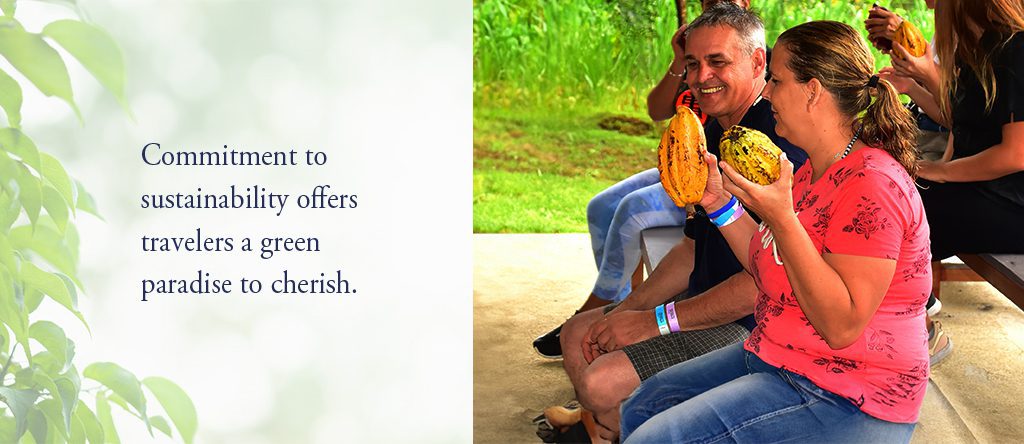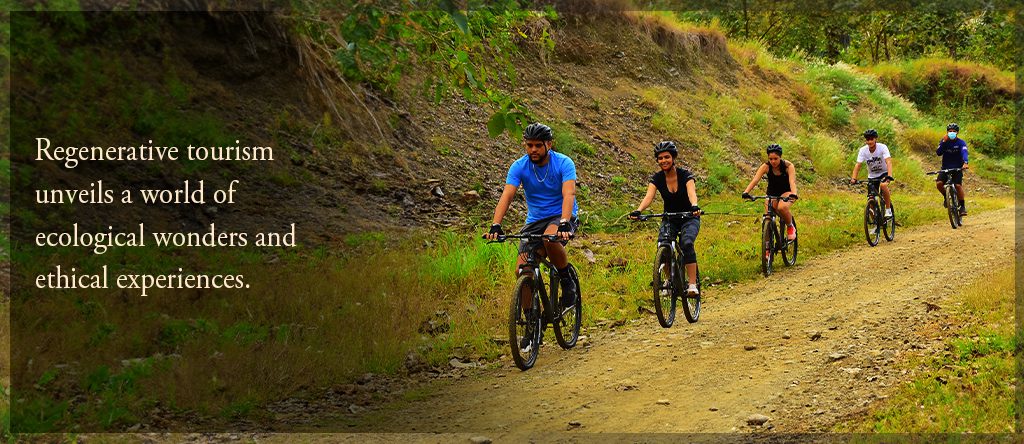Sustainability and ecotourism are increasingly popular trends in the global travel industry. These types of tourism focus on minimizing the environmental impact of travel and promoting responsible practices that benefit local communities and the environment. Costa Rica is a pioneer in sustainable tourism practices. The country has a long conservation and environmental protection history, and it is home to some of the most biodiverse ecosystems in the world. Costa Rica has also committed to using renewable energy sources, and it is now one of the most carbon-neutral countries in the world.
This blog will explore the initiatives taken to promote ecotourism in Costa Rica. We will look at the country’s commitment to environmental conservation, eco-friendly accommodations and infrastructure, responsible wildlife tourism, sustainable adventure and outdoor activities, sustainable gastronomy and farm-to-table practices, and the challenges and future outlook for sustainable tourism in Costa Rica. We will also look at how Villa Firenze is following sustainable practices, making it one of the most suitable family vacation destinations in Costa Rica.
Costa Rica’s Commitment to Environmental Conservation
Costa Rica is home to an incredible diversity of plant and animal life. The country is home to over 500,000 species of plants and animals, including over 2,000 bird species. This Central American country is also home to some of the most essential rainforests in the world, including the Amazon and Mesoamerican rainforests.
The history of Costa Rica holds that the government has been in conservation for a long time. In 1940, the government established the first national park in Costa Rica, and today the country has over 27 national parks and over 500 protected areas. The government has also committed to using renewable energy sources, and it is now one of the most carbon-neutral countries in the world.
- Costa Rica Green Hotels Certification Program: This program recognizes hotels that meet certain sustainability standards, such as using renewable energy, reducing water consumption, and minimizing waste. Over 300 eco-hotels in Costa Rica have been certified by this program.
- Rainforest Alliance: This organization works to promote sustainable agriculture. The Rainforest Alliance has certified over 1,000 farms in the country, which means that these farms are using practices that protect the environment and benefit local communities.
- Sustainable Tourism Osa: The Sustainable Tourism Osa initiative aims to make the Osa Peninsula a sustainable tourist destination known for its biodiverse rainforests with exotic flora and fauna. It ensures tourism protects the environment and benefits local communities.

Sustainable Practices Followed in Costa Rica
Numerous impressive measures have been implemented to promote sustainability in Costa Rica, earning them a prominent position on the Sustainable Development Goals Index. Some notable practices include:
1. Costa Rica has successfully maintained 98% of its land as forested areas, in stark contrast to the United States 34% deforestation-free status. This dedication to preserving forests has played a significant role in combating climate change.
2. An astounding 99% of electricity is generated from renewable sources, such as hydro, wind, and solar power. This achievement is mainly attributed to substantial investments in hydroelectric power, accounting for 80% of their renewable energy production.
3. The country has made significant strides in recycling, managing to recycle 60% of its waste. This commendable feat is mainly due to the “pay as you throw” program, where residents are charged based on their trash’s weight.
4. Costa Rica strongly emphasizes sustainability education, making it mandatory for all students from elementary school to university. The government has integrated sustainability into its national development plan, demonstrating its commitment to fostering environmentally conscious citizens.
5. The country also boasts one of the world’s most diverse ecosystems, with over 25% of its territory dedicated to national parks and reserves. This conscientious approach allows Costa Ricans to appreciate their natural environment while safeguarding it for future generations.
6. Tourism plays a pivotal role in the economy, driving the adoption of initiatives for sustainability in Costa Rica nationwide.
7. The government has prioritized sustainability by implementing various policies and laws to support its goals for resolving environmental issues in Costa Rica. Examples include a carbon tax and robust ecological regulations.
Responsible Wildlife Tourism in Costa Rica
Wildlife tourism in Costa Rica has gained immense popularity, attracting visitors eager to experience the country’s rich biodiversity. However, responsible travel is essential to ensure the preservation of delicate ecosystems and the well-being of wildlife. Here are some ways to engage in sustainable wildlife encounters:
1. Eco-Conscious Wildlife Lodges: Opt for accommodations that prioritize eco-friendly practices, support conservation initiatives, and minimize their impact on the surrounding environment.
2. Participating in Citizen Science: Contribute to scientific research and conservation efforts by joining citizen science programs, allowing tourists to collect data and monitor wildlife.
3. Volunteering for Conservation Projects: Many organizations and sanctuaries offer volunteer programs that allow travelers to contribute to the protection and rehabilitation of wildlife actively.
4. Supporting Certified Tour Operators: Choose wildlife tour operators certified by responsible travel organizations to ensure ethical and sustainable wildlife experiences.
5. Adopting Wildlife-Friendly Habits: Learn about wildlife-friendly behaviors and follow guidelines that minimize disturbance to animals and their habitats.
6. Respecting Protected Areas: Follow all rules and regulations when visiting national parks and reserves to preserve fragile ecosystems and minimize human impact.
7. Promoting Local Conservation: Engage with local conservation groups and support initiatives that protect wildlife and their natural habitats.
8. Wildlife Photography Ethics: Use zoom lenses to capture wildlife photos from a distance, avoiding flash or excessive noise that could distress the animals.
9. Choosing Wildlife-Focused Educational Tours: Opt for tours that emphasize educating visitors about the importance of wildlife conservation and the need to protect natural habitats.
10. Participating in Tree-Planting Initiatives: Support reforestation efforts to expand wildlife habitats and combat deforestation.
Sustainable Adventure Activities in Costa Rica
You get many sustainable outdoor and adventure activities in Costa Rica that allow you to immerse yourself in nature while respecting the environment. Here are some exciting options to consider:
1. Zip-lining: Experience the breathtaking rainforest from a unique vantage point as you soar through the treetops. Zip-lining is a thrilling yet low-impact activity that provides an exhilarating eco-adventure.
2. Hiking: Explore the diverse landscapes of Costa Rica through its numerous hiking trails. Wander amidst lush rainforests, majestic mountains, and picturesque beaches, all while appreciating the beauty of nature. Ensure you properly understand the essential things to know for an enjoyable hike in Costa Rica.
3. Whitewater Rafting: Get your heart racing with an adrenaline-pumping whitewater rafting adventure. Prioritize companies that adhere to sustainable practices, ensuring minimal disturbance to the pristine river ecosystems.
4. Surfing: Ride the world-renowned waves of Costa Rica, a surfer’s paradise. Enjoy the surf responsibly, respecting the coastal environment and marine life.
5. Canyoning and Waterfall Rappelling: Experience the thrill of descending waterfalls through canyoning while preserving the delicate ecosystems surrounding these natural wonders.
6. Mountain Biking: Traverse scenic trails on a mountain bike, appreciating the natural beauty of Costa Rica while minimizing your carbon footprint.
7. Snorkeling and Scuba Diving: Discover the vibrant underwater world of the marine reserves, following responsible diving practices to protect delicate coral reefs and marine life.

Sustainable Gastronomy and Farm-to-Table Practices
The culinary tradition of the country is deeply rooted in fresh, local ingredients and sustainable practices. Explore the sustainable gastronomy and farm-to-table reflected in the Costa Rican diet to delight your taste buds responsibly:
1. Supporting Local Farmers: Dine at restaurants that prioritize locally-sourced ingredients, contributing to the livelihoods of local farmers and reducing the carbon footprint of food transportation.
2. Eco-conscious Farming Practices: Indulge in dishes prepared with ingredients grown sustainably, showcasing the commitment to preserving soil health and water resources.
3. Zero-Waste Culinary Experience: Opt for restaurants that emphasize reducing food waste through innovative cooking techniques and waste management practices, minimizing the impact of food production on the environment.
4. Plant-based and Vegan Options: Explore the burgeoning plant-based dining scene in Costa Rica, choosing sustainable and environmentally friendly dishes that celebrate the rich flavors of nature.
5. Farm Visits and Agritourism: Embark on farm visits and agritourism experiences to connect with local producers, gaining insight into sustainable farming methods and the importance of biodiversity in agriculture.
6. Seafood Sustainability: If you indulge in seafood, choose restaurants that adhere to sustainable fishing practices, supporting the conservation of marine ecosystems and responsible seafood consumption.
Challenges and Future Outlook for Sustainable Tourism in Costa Rica
Costa Rica’s journey toward sustainable tourism has its challenges. As the tourism sector grows, striking a delicate balance between development and conservation emerges as a critical concern. Several challenges need addressing to ensure a sustainable future for tourism in Costa Rica.
1. Balancing Tourism Growth with Conservation: The surge in tourism poses the challenge of managing the increased footfall while preserving the country’s precious natural resources. Finding innovative ways to accommodate visitors without compromising the environment is a pressing task.
2. Ensuring Sustainability Across All Tourism Businesses: While some businesses have embraced sustainable practices, ensuring that all tourism entities adhere to eco-friendly principles remains a priority. Encouraging and monitoring the adoption of sustainable practices across the entire industry is crucial.
3. Educating Travelers about Sustainable Tourism Practices: Educating travelers about sustainable and regenerative tourism practices is essential for fostering responsible travel behaviors. Raising awareness about eco-conscious choices, such as supporting sustainable destinations and reducing their environmental footprint while traveling, can lead to a positive impact.
4. Managing the Impact of Climate Change: Climate change in Costa Rica poses significant challenges for the tourism industry. As a major contributor to climate change in Costa Rica, the sector must mitigate its carbon footprint and adapt to the changing and resolving environmental issues in Costa Rica that impact tourism activities.
5. Involving Local Communities in Sustainable Tourism: Local communities play a vital role in sustainable tourism. Ensuring their active involvement in the planning and execution of sustainable initiatives fosters a sense of ownership and ensures that tourism benefits reach the grassroots level.
Despite these challenges, Costa Rica remains steadfast in its commitment to sustainable tourism. The collective efforts of the government, businesses, and local communities create a united front toward making the country a shining example of Costa Rica sustainable tourism leadership.
Villa Firenze – Your Sustainable Accommodation on the Pacific Coast of Costa Rica
Nestled on the picturesque Pacific Coast of Costa Rica, Villa Firenze offers a truly remarkable experience, combining luxury with a strong commitment to environmental sustainability. Embracing responsible practices for promoting ecotourism in Costa Rica, the villa has implemented various initiatives to reduce its ecological footprint and contribute positively to the local community.
One of the primary pillars of Villa Firenze’s sustainability efforts lies in its power consumption strategies. Harnessing the abundant Costa Rican sunlight, the villa is powered by solar energy. The commitment to eco-friendliness extends to every corner of the villa. Conscious choices in lighting solutions are evident through using energy-efficient LED lights throughout the accommodation. Not only do these lights significantly reduce energy consumption, but they also have a longer lifespan, further promoting sustainable resource management.
Our luxury villa rental in Costa Rica takes pride in championing a “Say No to Plastic” policy. Guests are offered drinks and beverages without plastic straws, aligning with the villa’s dedication to minimizing non-biodegradable waste production. The establishment has implemented an effective recycling program in tandem with this effort. Garbage is meticulously segregated into different categories, allowing for efficient recycling and minimizing waste sent to landfills.
Furthermore, Villa Firenze strongly emphasizes supporting local communities and ensuring the equitable distribution of economic resources. The culinary team takes pride in using locally sourced zero-kilometer ingredients, prioritizing ecological and organic produce, encouraging sustainable agricultural practices, and reducing the carbon footprint associated with food sourcing.

Conclusion
Costa Rica is a pioneer in sustainable tourism. The country has a long history of conservation, a commitment to using renewable energy sources, and a wide variety of accommodations like eco-friendly resorts and villas. The country is also a great place to enjoy a variety of sustainable adventure and outdoor activities, as well as sustainable gastronomy and farm-to-table practices.
We hope this blog has inspired you to visit Costa Rica and experience the country’s eco-friendly tourism offerings. Remember to be a responsible steward of the environment while there and help support sustainable tourism efforts.











